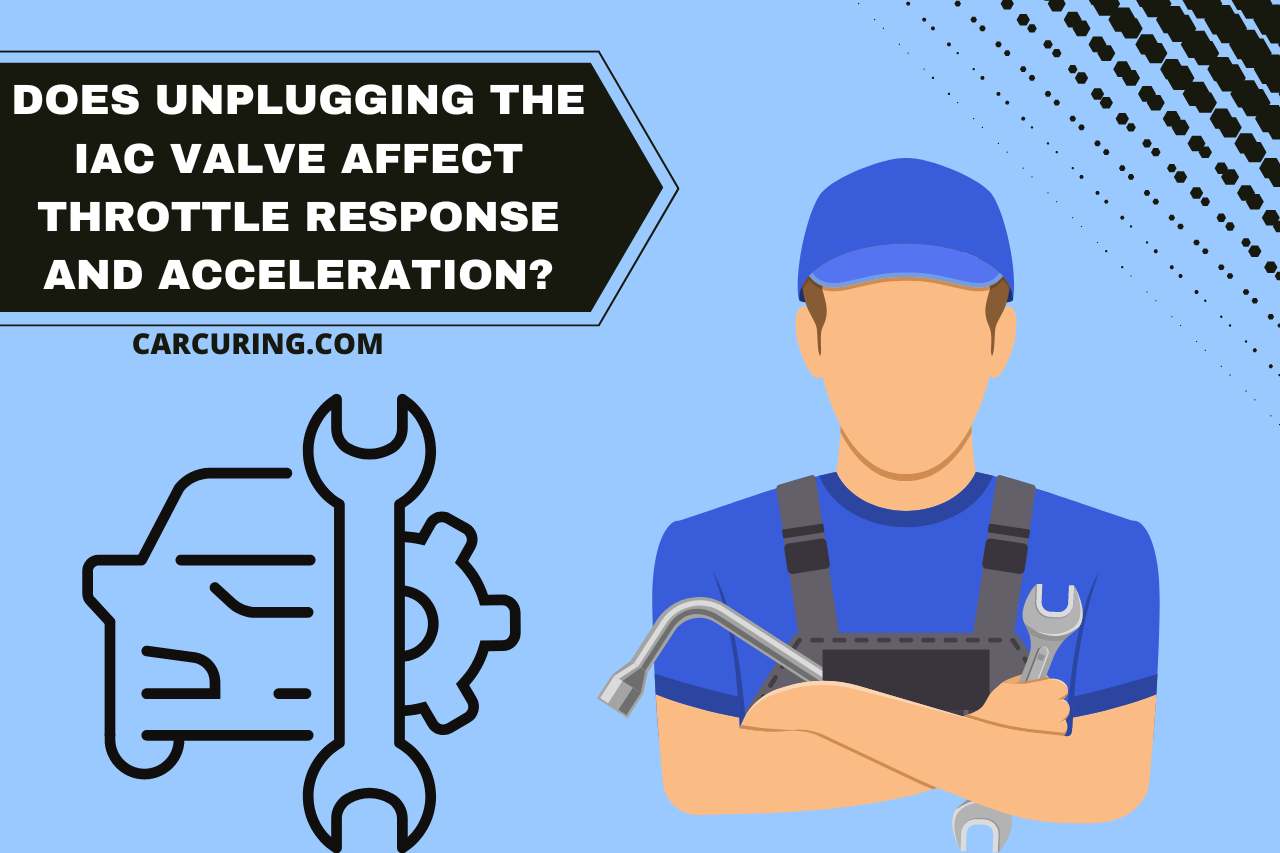A smooth and constant idle speed for your car’s engine is crucially maintained by the Idle Air Control (IAC) valve. But what happens if you Unplug the Idle Air Control Valve? Unpredictable engine behavior, like erratic revving, harsh idling, and even engine stalling, might result from disconnecting the idle air control valve. This article will examine the effects of removing the IAC valve.
What is the Idle Air Control (IAC) Valve and Its Role in Engine Operation?
The Idle Air Control (IAC) valve is an integral part of fuel-injected cars. It controls how quickly the engine rotates at idle. This valve ensures the engine idles smoothly and stops the car from stalling when it comes to a halt.
Integrated with the throttle body or existing as a separate unit, the IAC valve collaborates with the vehicle’s Electronic Control Unit (ECU) to precisely control airflow to the engine.
The IAC valve plays a significant role in providing constant and stable idling by electrically changing the airflow. It will add to the overall effectiveness and dependability of the engine’s functioning.
Why Would Someone Consider Unplugging the Idle Air Control Valve?
You may think about unplugging the device when the IACV malfunctions resulting in issues like uneven idle speeds, stalling, and weakened engine performance. The IACV’s job is to keep the engine running at the proper RPMs for performance and efficiency.
A flawed IACV can throw off this equilibrium. Temporarily unplugging it can assist in fixing the problems by enabling the engine to operate without the IACV’s impact. It may be a temporary fix until suitable repairs or replacements can be made.
While doing this may relieve specific symptoms, addressing the root cause of the problem is crucial for maintaining the engine’s health in the long run.
What Happens if You Unplug Idle Air Control Valve?
The engine’s capacity to regulate idle speed is interfered with when the Idle Air Control (IAC) valve is unplugged. It causes irregular revving and the possibility of stalling. Especially when starting up after parking.
The engine should reach its typical idle speed when it warms up. But disconnecting the IAC valve results in symptoms like erratic idling, poor engine performance, stalling, and the dashboard’s check engine light coming on.
The IAC valve plays an essential role in maintaining a steady idle. These disruptive behaviors may result from its separation, highlighting how urgently underlying IAC valve problems must be resolved.
What Are the Potential Effects of Unplugging the IAC Valve?
Engine performance may suffer if the Idle Air Control (IAC) valve is disconnected. It includes issues with the car starting, stalling, and erratic idle.
Long-term disconnections can destroy other car parts, including the oxygen sensor and catalytic converter. The IAC valve is necessary to keep the idle speed stable, ensure efficient combustion, and ensure optimal engine running.
Disrupting this system can reduce engine performance. It causes operating severe issues and, in the long run, may even damage vital components.
How Does Unplugging the IAC Valve Affect Idle Speed and Stability?
The engine’s ability to control idle speed is disrupted when the Idle Air Control (IAC) valve is unplugged, causing unpredictable revving and possibly stalling.
This effect is especially audible when the car is first started after it has been parked. The engine’s idle speed tends to return to normal when it warms up. The IAC valve is crucial for preserving steady idling conditions by controlling air intake.
Up until the warm-up procedure stabilizes the idle speed, disabling it results in an unregulated air supply, weakening engine stability and producing variable RPMs.

Does Unplugging the IAC Valve Affect Throttle Response and Acceleration?
The answer is yes. Turning off the idle air control (IAC) valve interferes with its ability to regulate airflow, which bypasses the throttle valve.
Due to this disruption, the engine may idle at considerably higher RPMs than is optimum or safe. Because of this, throttle response and acceleration can be adversely affected.
Smooth transitions between various engine states are made possible because of the IAC valve’s function in controlling idle air.
By unplugging it, the engine loses this fine-tuned control, potentially leading to a surge in RPMs during acceleration and compromised throttle response, resulting in an overall unfavorable driving experience.
Could Unplug the IAC Valve Trigger Warning Lights or Error Codes?
Turning off the Idle Air Control Valve (IACV) prevents the engine from controlling its idle speed. It may result in rough running or stalling at low speeds. The check engine light on the dashboard may also come on due to this action.
Idling consistency is maintained by the IACV. So interfering with it could result in the engine acting unpredictably. It will activate the car’s onboard diagnostics system.
When it notices abnormal conditions, this system generates error codes and lights the check engine light to alert the driver to a potential issue that needs attention.
How Does Unplugging the IAC Valve Relate to Fuel Efficiency?
The Idle Air Control Valve (IACV) controls the engine’s air intake. It is essential for efficient combustion. The engine may run lean and lose power and fuel economy if the IACV is damaged or disconnected. Less fuel is given relative to the air in a lean mixture, which affects the effectiveness of combustion.
IACV control over air intake is lost when it is unplugged, causing the engine to run richer more fuel is supplied than air and the engine operates more efficiently. Because there is excessive fuel use without accurate air regulation, there will be less efficient combustion and less mileage from this more decadent combination.
Is Unplugging the IAC Valve Ever Recommended for Diagnostic Purposes?
It is safe to temporarily unhook the Idle Air Control (IAC) valve for diagnostic purposes. Unplugging the IAC valve can assist in troubleshooting difficulties with your car’s engine, including excessive or low idle rates and stalling.
This procedure can reveal whether the IAC valve contributes to the problems. It’s imperative to consult with a knowledgeable mechanic before making any modifications to your car’s engine.
The IAC valve can be temporarily unplugged to identify potential issues that might hurt the engine’s performance. The IAC valve is important for ensuring optimal engine performance and fuel efficiency.
Watch this one,
Video Credits – Babji Motors
You May Also Like


